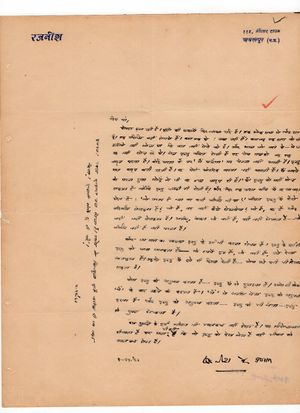Letter written on 1 Nov 1962 om: Difference between revisions
(Created page with "right|300px This is one of hundreds of letters Osho wrote to Ma Anandmayee, then known as Madan Kunwar Parekh. It was written on 1...") |
Dhyanantar (talk | contribs) No edit summary |
||
| (7 intermediate revisions by 2 users not shown) | |||
| Line 1: | Line 1: | ||
[[ | This is one of hundreds of letters Osho wrote to [[Ma Anandmayee]], then known as Madan Kunwar Parakh. It was written on 1st November 1962 late in the afternoon. It has a small PS which is added on next day, 2nd Nov, before mailing it. The letterhead has a simple "रजनीश" (Rajneesh) in the top left area, in a heavy but florid font, and "115, Napier Town, Jabalpur (M.P.)" in the top right, in a lighter but still somewhat florid font. | ||
Osho's salutation in this letter is a fairly typical "प्रिय मां", Priya Maan, Dear Mom. There are few of the hand-written marks that have been observed in other letters: black and red tick marks in the upper right corner and a mirror-image number in the bottom right corner. And in a new variation on that theme, there are actually three numbers there, one crossed out (143) and replaced by another number which is itself crossed out and finally replaced by a pink number, 145. | |||
The letter has been published, in ''[[Bhavna Ke Bhojpatron Par Osho (भावना के भोजपत्रों पर ओशो)]]'' (2002 Diamond edition, p 170). | |||
PS reads: "Today, received your letter - which absolutely brought you standing in front! Your breath really passed touching me!" | |||
{| class = "wikitable" style="margin-left: 50px; margin-right: 100px;" | |||
|- | |||
|[[image:Letters to Anandmayee 937.jpg|right|300px]] | |||
रजनीश | |||
११५, नेपियर टाउन<br> | |||
जबलपुर (म.प्र.) | |||
प्रिय मां,<br> | |||
दोपहर ढ़ल रही है। वृक्षों छायायें फिर लम्बा गई है। एक शोक सभा से लौट रहा हूँ। एक परिचित नहिं होगये हैं। कल तक थे : अब नहीं हैं। कल तक एक क्षण को भी उन्होंने नहीं सोचा था कल नहीं होने को है। और आज जो वहां थे – वे भी यह नहीं सोच रहे थे। रोज मृत्यु घटित होती है पर शेष सब को वह एक वाह्य घटना है। कोई मरता है पर ‘मैं मरूँगा’ यह चेतना नहीं आती है। मृत्यु सदा वाह्य बनी रहती है। वह मेरी आंतरिक घटना नहीं बनती है। मैं अपने को मरता हुआ सोचूँ तो भी वह तथ्य वाह्य ही है। ‘मैं’ मृत्यु को नहीं सोच सकता है क्योंकि मृत्यु उसकी ही होती है! और फिर एक प्रश्न बीच में उठ आ खड़ा होता है : ‘जो मरता है क्या वह कभी जीवित भी था?’ जीवन मृत्यु में कैसे परिणित होसकता है? जो है, वह नहीं कैसे होजायेगा? जो है, वह है और नहीं नहीं होसकता है। अर्थात्, केवल जो नहीं है, वही नहीं होजाता है – जो जीवित नहीं वही मरता है। | |||
और इस सत्य का साक्षात मृत्यु के पूर्व भी करना संभव है : मृत्यु के पूर्व ही मृत्यु को जाना जासकता है – जो हममें मृत है, जो नहीं है, उसे देखा जासकता है। प्रकृति मृत्यु में इसे ही दिखा देती है – योग इसे कभी भी दिखा सकता है। | |||
योग मृत्यु का अनुभव करना है – मृत्यु में से गुजरना है। इससे ही योग ‘मैं’ के पार उठने को कहता है। ‘मैं’ से अतीत होना मृत्यु को अनुभव करना है और मृत्यु को अनुभव करना – मृत्यु को जी लेना – मृत्यु से मुक्त होजाना है। | |||
इस मुक्ति के पूर्व जीवन भी उपलब्ध नहीं होता है। यह विरोधाभास दीखता है पर सत्य भी यही है कि जो मृत्यु को देख लेता है वही जीवन को भी उपलब्ध होता है। | |||
१-११.‘६२ | |||
रजनीश के प्रणाम | |||
पुनश्च: आज तुम्हारा पत्र मिला है। उसने तो बिल्कुल तुम्हें करीब ही ला खड़ा किया! तुम्हारी सांसें छू ही गईं! | |||
२.११.‘६२ | |||
|} | |||
See also [[Letters to Anandmayee]] | ;See also | ||
:[[Bhavna Ke Bhojpatron ~ 096]] - The event of this letter. | |||
:[[Letters to Anandmayee]] - Overview page of these letters. | |||
[[ | [[Category:Manuscripts|Letter 1962-11-01-om]] [[Category:Manuscript Letters (hi:पांडुलिपि पत्र)|Letter 1962-11-01-om]] | ||
[[Category:Newly discovered since 1990|Letter 1962-11-01-om]] | |||
Latest revision as of 14:35, 24 May 2022
This is one of hundreds of letters Osho wrote to Ma Anandmayee, then known as Madan Kunwar Parakh. It was written on 1st November 1962 late in the afternoon. It has a small PS which is added on next day, 2nd Nov, before mailing it. The letterhead has a simple "रजनीश" (Rajneesh) in the top left area, in a heavy but florid font, and "115, Napier Town, Jabalpur (M.P.)" in the top right, in a lighter but still somewhat florid font.
Osho's salutation in this letter is a fairly typical "प्रिय मां", Priya Maan, Dear Mom. There are few of the hand-written marks that have been observed in other letters: black and red tick marks in the upper right corner and a mirror-image number in the bottom right corner. And in a new variation on that theme, there are actually three numbers there, one crossed out (143) and replaced by another number which is itself crossed out and finally replaced by a pink number, 145.
The letter has been published, in Bhavna Ke Bhojpatron Par Osho (भावना के भोजपत्रों पर ओशो) (2002 Diamond edition, p 170).
PS reads: "Today, received your letter - which absolutely brought you standing in front! Your breath really passed touching me!"
- See also
- Bhavna Ke Bhojpatron ~ 096 - The event of this letter.
- Letters to Anandmayee - Overview page of these letters.

